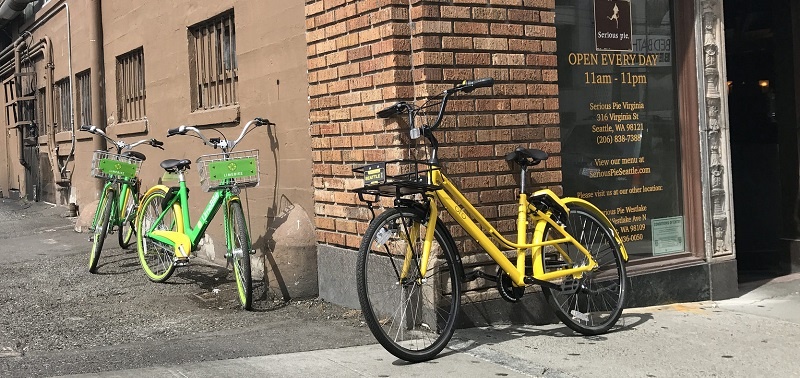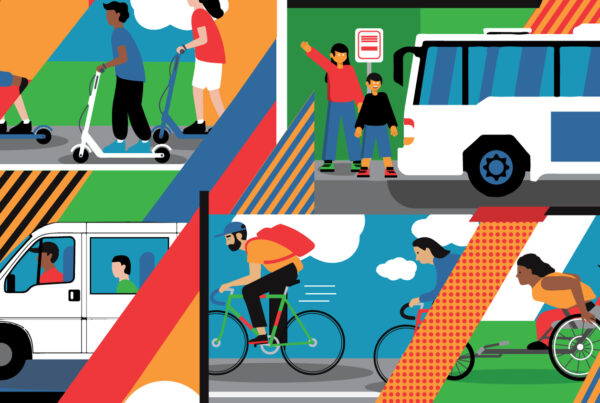From dockless bikesharing systems to microtransit partnerships, shared mobility has continued to evolve at a rapid pace over the last several months. To help you keep up to date on the latest developments, SUMC regularly adds new policies to our Shared Mobility Policy Database.
Our online tool is open to the public (you can create a free account for full access), and features more than 800 of the most important shared mobility policies, studies and strategic plans in North America. The database also provides best practices, case studies and analysis to help local governments craft an effective regulatory approach to ridesourcing, bikesharing, carsharing and other shared transportation services.
Following is a round-up of new and notable policies, along with links to the corresponding database entries, which contain the original policy files.
Bikeshare Permit Requirements, Seattle, Washington, 2017
Seattle, WA
6/30/17
After Seattle ended its traditional bikeshare system, Pronto, several private “dockless” bikeshare operators announced their interest in the city. The Seattle Department of Transportation (SDOT) responded by opening a six-month pilot program that established a regulatory framework for private bikeshare operators. The program features several stipulations, such as granting SDOT the right to “geo-fence” where the shared bikes may be parked, mandating that companies keep records of maintenance activities, and requiring them to share real-time location data for every bicycle parked in the Seattle operational area.
Currently, there are three dockless bikeshare companies operating in the city: Spin, LimeBike, and Ofo. Garland, Texas-based VBikes has also filed for a permit to operate in the city but has not yet set a launch date. The new program as already grown to 3,000 bikes—compared with Pronto’s 500—and could soon double in size to 6,000.
Pickup by Capital Metro (Austin, TX), 2017
Austin, TX
6/6/17
Austin’s transit agency, Capital Metro, partnered with ride-hailing company Via to launch Pickup, a door-to-door, on-demand public transportation service. Riders in Northeast Austin can use the Pickup app to hail a pooled ride from one of two nine-passenger vans. The service will operate from 9am to 6pm on Tuesdays, Thursdays, and Saturdays, with an estimated wait time of 15 minutes per ride.
Operated by Capital Metro with back-end support provided by Via, the program marks the first time that Via’s on-demand transit technology will be deployed in a public transit context in the U.S. Pickup, which replaces CapMetro’s Metro Flex Upper Eastside pilot route, is free of charge for a limited time.
RTD GO! Partnership between Uber and Regional Transit District, San Joaquin County, California, 2017
San Joaquin, CA
7/3/17
The San Joaquin Regional Transit District (RTD) launched “RTD GO!” in partnership with Uber on July 3, 2017. The pilot program will allow passengers taking a trip from outside the normal RTD service area to hail an Uber ride at a discount of 50 percent (up to $5) to reach one of eight local transit centers. The service will be available Monday through Friday, 6 a.m.-10 p.m. This one-year pilot aims to provide first/last mile connections to make it easier for residents who live in remote parts of San Joaquin County to access public transit.
Scoop and Contra Costa Transportation Authority Partnership
Contra Costa, California
5/22/17
Contra Costa Transportation Authority (CCTA) and Scoop Technologies debuted a pilot program in May to encourage carpooling in the San Francisco Bay. Through this partnership, CCTA will leverage 511 Contra Costa (the local transportation demand management program) to offer $2 off Scoop carpool rides (normally $5) for local commuters. To schedule carpools, passengers can download the Scoop app and enter their commute details either the night before (for morning commutes) or a few hours in advance (for afternoon commutes). The Scoop app will then match them with another commuter driving along a similar route. The aim of the program, which is supported by funds from Measure J, a half-cent sales tax for transportation, is to reduce single-occupancy vehicle trips and alleviate traffic congestion.
Portland (OR) Adaptive Bikeshare Pilot, 2017
Portland, OR
7/21/17
The Portland Bureau of Transportation (PBOT) launched a pilot project to integrate adaptive bicycling options to complement the city’s 1,000-bike Biketown bikeshare system. The new program, “Adaptive Biketown,” allows residents with disabilities to access a variety of bikes—including hand-cycles, trikes and tandems—at Kerr Bikes, located in downtown Portland. First-time users make an appointment for an initial orientation and adaptive bike fitting, after which their “rider profiles” are saved for future use. The program includes short-term (1 to 3 hours) adaptive bike rental, bike helmet rental, and storage of a user’s mobility device or service animal during rental time.
Do you have a question, or an idea for a policy to add? If so, please contact our research team at policies@sharedusemobilitycenter.org. To keep up to date on upgrades to SUMC’s Shared Mobility Toolkit and other new developments, be sure to sign up for SUMC’s newsletter, the Mobility Hub.
Image credit: Kiewic


